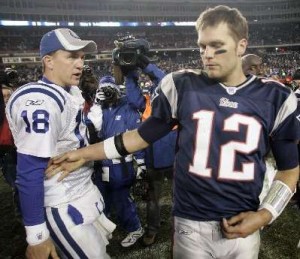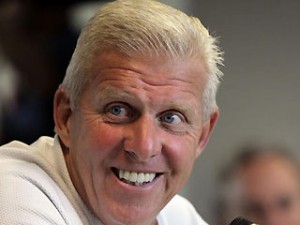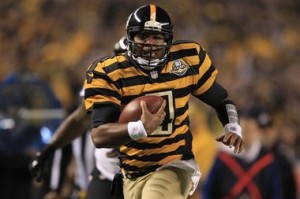One of the obvious topics the mainstream media has hit on this week has been Matt Ryan’s inability to win in the playoffs. As everyone knows, Atlanta is 0-3 in the playoffs in the Mike Smith/Matt Ryan era. As Ryan prepares for his fourth playoff start on Sunday, history offers some comfort: four other quarterbacks (since 1950) have been in exactly the same situation, entering their fourth playoff start with an 0-3 record. Those quarterbacks went 3-1 in their fourth game. Let’s stroll down memory lane.
- At age 37, Y.A. Tittle and the New York Giants went to Soldier Field to battle the famed 1963 Bears. Tittle had gone 0-3 in his previous three NFL playoff games, and had lost his lone playoff game in the AAFC, too. In 1957, Tittle was on the wrong side of the most famous comeback in playoff history prior to Bills/Oilers. In that game, Tittle threw three touchdowns against the Lions as San Francisco opened up what looked to be an insurmountable 27-7 lead. But Tittle finished the day with three interceptions, and the Lions came back and won, 31-27. In 1961, Tittle was with the Giants, and was part of an embarassing 37-0 shutout on the quite literal frozen tundra of Lambeau Field. Tittle was a miserable 6/20 for 65 yards with 4 interceptions. The next year, the Giants and Packers met again, this time at a frozen and windy Yankee Stadium, with the Packers again topping the Giants. [1]This was the first game Ed Sabol filmed for the NFL, under the label Blair Motion Pictures. So you can imagine that when Tittle and the Giants had to travel to Soldier Field in 1963 — the Giants third straight year in the title game — Tittle probably carried the choker label. With a wind chill of -11 degrees, the weather was again miserable, and the result was more of the same for Tittle and New York. The Giants lost 14-10, and Tittle threw 1 touchdown against 5 interceptions.
- Jack Kemp took the Chargers to the AFL title game in the league’s first two seasons. On New Year’s Day 1961, Kemp was outplayed by Houston’s George Blanda, and Billy Cannon put the final nail in the coffin as the Oilers won, 24-16. The Oilers and Chargers met again in the title game the following year — this time in San Diego — but Kemp had a miserable game, throwing 4 interceptions as the Chargers lost, 10-3. By 1963, Kemp was with the Bills, and Buffalo had finished the year tied with the Patriots, setting up a one-game playoff for the division title at War Memorial Stadium. But Kemp struggled and was benched for Daryle Lamonica at halftime, as the Bills lost 26-8. In 1964, the Bills went 12-2, and entered the AFL title game against Kemp’s old team, San Diego. At this time, Kemp had an 0-3 post-season record, and surely Chargers fans taunted the citizens of Buffalo by calling Kemp the Mayor of Chokesville. While Kemp did not produce stellar numbers, the Bills managed to defeat the Chargers and capture their first AFL championship. The hero of the game may have been Mike Stratton, who produced the “hit heard round the world” early in the game, knocking out San Diego’s Keith Lincoln. In any event, the Mayor of Chokesville was able to abdicate his throne.
References
| ↑1 | This was the first game Ed Sabol filmed for the NFL, under the label Blair Motion Pictures. |
|---|




